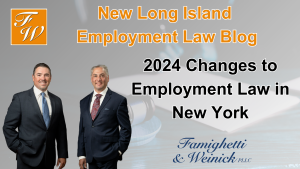Employment laws in New York are complex and always evolving. In 2024, various existing employment laws will see changes take effect. In addition, some entirely new laws will take effect. Today’s Long Island employment law blog will take a look at some of the changes so that employers can consider compliance options and so that employees understand their rights.
The Freelance Isn’t Free Act
A hotly contested issue in employment law is whether workers are independent contractors or employees. Many employers try to categorize workers as independent contractors to avoid many of the legal obligations that come along with adding an employee to payroll. The Freelance Isn’t Free Act is an attempt to add some protections for independent contractors.
The Freelance Isn’t Free Act applies to “freelance workers.” Freelance workers are defined essentially as independent contractors, but the definition also includes independent contractors who operate under a corporate or trade name, not just under their individual name.
The Freelance Isn’t Free Act requires use of a written contract between the business and independent contractor. The contract is required when either (a) a single project on which the worker will work costs more than $800 or (b) within 120 days, the independent contractor provides multiple services which exceeds $800, collectively.
The law requires that the contract contain certain information, including: names and contact information for the worker and business; a description of the services to be performed; the rate of pay and the date on which payment is due; and a date when the worker must submit an invoice to the business in order to be paid on time. The law also requires that the business pay the worker pursuant to the contract, or no later than 30 days after completion of the work.
Like traditional employment laws, the Freelance Isn’t Free Act contains an anti-retaliation provision which prohibits businesses from discriminating or retaliating against workers who exercise or attempt to exercise their rights under the act. Businesses who violate the law may be subject to investigations by the Department of Law or may face civil actions brought by the worker. Workers have six years to file claims and may recover actual damages, double damages, and attorneys’ fees and costs.
Human Rights Law Statute of Limitations
The New York Human Rights Law is New York’s workplace anti-discrimination law. The law provided for confusing patchwork of statutes of limitations. A statute of limitation is the time by which a lawsuit must be filed for a particular type of claim. For example, generally in New York, to sue for a breach of contract the lawsuit must be filed within six years of the breach. To sue for injuries sustained from a car accident (negligence) the case must be started within three years of the injury.
Under the Human Rights Law, workers could either file a claim with the New York State Division of Human Rights, or file the case directly in court. If filing with the Division, the claim must have been filed within one year of the discrimination. Several years ago, that deadline was extended to three years, but just for sexual harassment claims. To file in court, the statute of limitations has been three years.
In 2024, the statute of limitations for all discrimination and retaliation claims filed in the New York State Division of Human Rights is now three years.
Confidentiality in Settlement Agreements
Several years ago, New York passed a law regulating confidentiality in settlement agreements arising from claims of workplace harassment. The law required that if confidentiality were included as part of the agreement (a) confidentiality would have to be the preference of the employee; (b) the confidentiality agreement would have to be in a separate document from the settlement agreement; and (c) the employee had to wait 21 days as a consideration period, before signing the agreement.
In 2024 amendments, the 21 day waiting period is waivable. However, this applies only in cases where the settlement is entered into pre-litigation. In addition, the law not extends to independent contractors, and it extends to all claims of discrimination, harassment, and retaliation, when the agreement requires liquidated damages for violation of a non-disclosure or non-disparagement provision, requires partial or complete forfeiture of a settlement payment for violation of a non-disclosure or non-disparagement provision, or where the agreement requires the victim to affirmatively state that he or she was not subject to unlawful discrimination.
Wage and Hour Law Round-up
- Salary basis test for exempt employees is increased from $1,125 per week to $1,200 per week
- Minimum wage increases: NYC, Westchester, and Long Island: $16.00 per hour (up from $15)
- Definition of clerical and other worker: executives, administrators, and professional employees must earn $1300 per week, instead of $900
Various Other Changes
- Social media law: Employers cannot demand applicants for usernames and passwords for social media accounts, or demand access to an employee’s social media accounts
- Height and weight discrimination is unlawful in New York City
If you have questions about these employment law changes, or about existing employment laws, contact a New York employment law attorney at Famighetti & Weinick PLLC. Our phone number is (631) 352-0050 and our website is http://linycemploymentlaw.com.

2024 Employment Law Changes
 Long Island Employment Law Blog
Long Island Employment Law Blog

